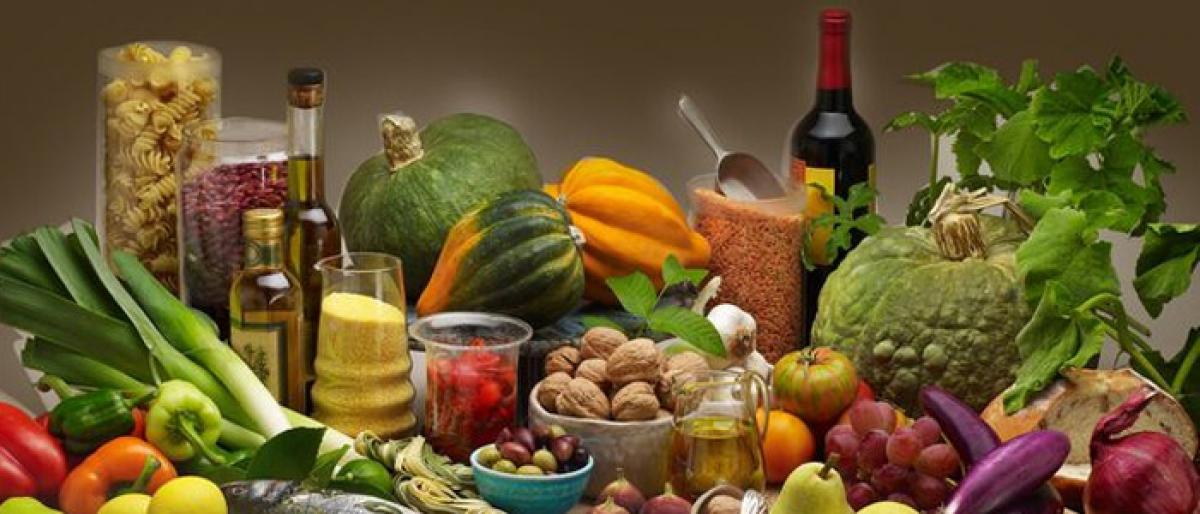Live
- Gold rates in Visakhapatnam surges, check the rates on 20 April 2024
- Gold rates in Vijayawada surges, check the rates on 20 April 2024
- Gold rates in Hyderabad surges, check the rates on 19 April 2024
- YS Sharmila to file nomination for Kadapa Lok Sabha constituency today
- Rains lash parts of Hyderabad bringing respite from heat
- Peddireddi continues tirade against former CM Kiran
- DCA raids three quacks
- ‘Kuppam Gadda-TDP Adda’, asserts Bhuvaneswari
- Never made people regret voting for me: Kishan Reddy
- ‘Garuda Prasadam’ at Chilkur Balaji throws traffic haywire on Moinabad Road
Just In

Years ago like India, the traditional Mediterranean household was unable to afford or procure white flour, white sugar, processed foods, butter and meats. Thus they grew and ate their local, seasonal and regional fruits and vegetables from their own orchards. Like coastal India that ate fish, due to the large Mediterranean coast, they ate fish regularly and red meat occasionally.
Years ago like India, the traditional Mediterranean household was unable to afford or procure white flour, white sugar, processed foods, butter and meats. Thus they grew and ate their local, seasonal and regional fruits and vegetables from their own orchards. Like coastal India that ate fish, due to the large Mediterranean coast, they ate fish regularly and red meat occasionally.
Dairy in the form of yoghurts and cheese were consumed. What we should note is the Mediterranean diet has been successful for the people of this region because they ate their simple local and seasonal foods. They very rarely adopted foods from other areas and stuck to what they knew best, exactly like what Indians did originally.
Being abundant in fruits, vegetables, whole grains, legumes, pulses, fish, small amounts of dairy and good quality fats the Mediterranean diet will make your table look like a cornucopia. This diet is majorly followed by people living in the areas of Greece, Southern Italy and Spain. Eating like the Mediterranean makes you reap multiple health benefits like improved weight loss, better control of blood sugar levels, prevents heart attacks, strokes, type-2 diabetes, reduced risk of depression, Alzheimer’s disease, inflammations and premature death. Read on to know what all is included in the Mediterranean diet.
Fats: A paradox diet when compared to conventional diets, even though it is high in fats, Mediterranean’s have lower rates of cardiovascular diseases than their Western counterparts who have similar fat consumption. This is because the diet is filled with tidbits of good quality fats from olive oil, avocado, nuts like walnuts, pistachios, hazelnuts and seeds like sesame and pumpkin seeds. The nuts and seeds make excellent snacking items.
Vegetables: A Mediterranean’s plate is always so fresh and colourful. From the red, yellow and green peppers, zucchini, eggplant, squash, tomatoes, onions, leeks and even cauliflower, they always ensure that there are vegetables in at least two of their meals.
Leafy greens: The best compliment to your vegetables are your leafy greens. Commonly used lettuce, spinach and mustard greens this diet support eating lots of salads.
Proteins: You will see a variety of proteins in the Mediterranean diet. Ranging from pulses like chickpeas, kidney beans, red lentils (masoordaal) to fava beans. This diet also includes fish and dairy in such as yoghurts and cheese and occasionally red meat.
Grains: They consumed not only whole wheat but also other grains like barley, buckwheat, millet, oats and couscous. They believe in eating ‘whole’ grains and not refined grains.
Spices: One of the reasons Mediterranean’s are able to eat lots of vegetables is because their foods are flavoured with herbs, spices and condiments. They grow garlic, basil, oregano, pepper, chillies, mint, bay leaf, cloves, rosemary, lavender, parsley and cumin.
Roots: Sweet potato and beets are some of the favourite add-on roots to meals in this diet.
Drinks: Along with water the Mediterranean’s are known to add a glass of wine along with one of their meals, especially the meal had with loved ones.
Fruits: Figs, grapes, pears and dates make multiple appearances across meals in the Mediterranean. Desserts are generally a fruit drizzled with honey.
Indians should also stick to our local and seasonal foods which provide if not the same but an even more delicious and nutritious meal. Our country can provide us with plenty of vegetables, leafy greens, proteins, grains and good quality fats.
A simple Indian diet consisting of a vegetable, roti with ghee, daal or fish will surely help you reap the equivalent health benefits of the Mediterranean diet did for its people.

© 2024 Hyderabad Media House Limited/The Hans India. All rights reserved. Powered by hocalwire.com







